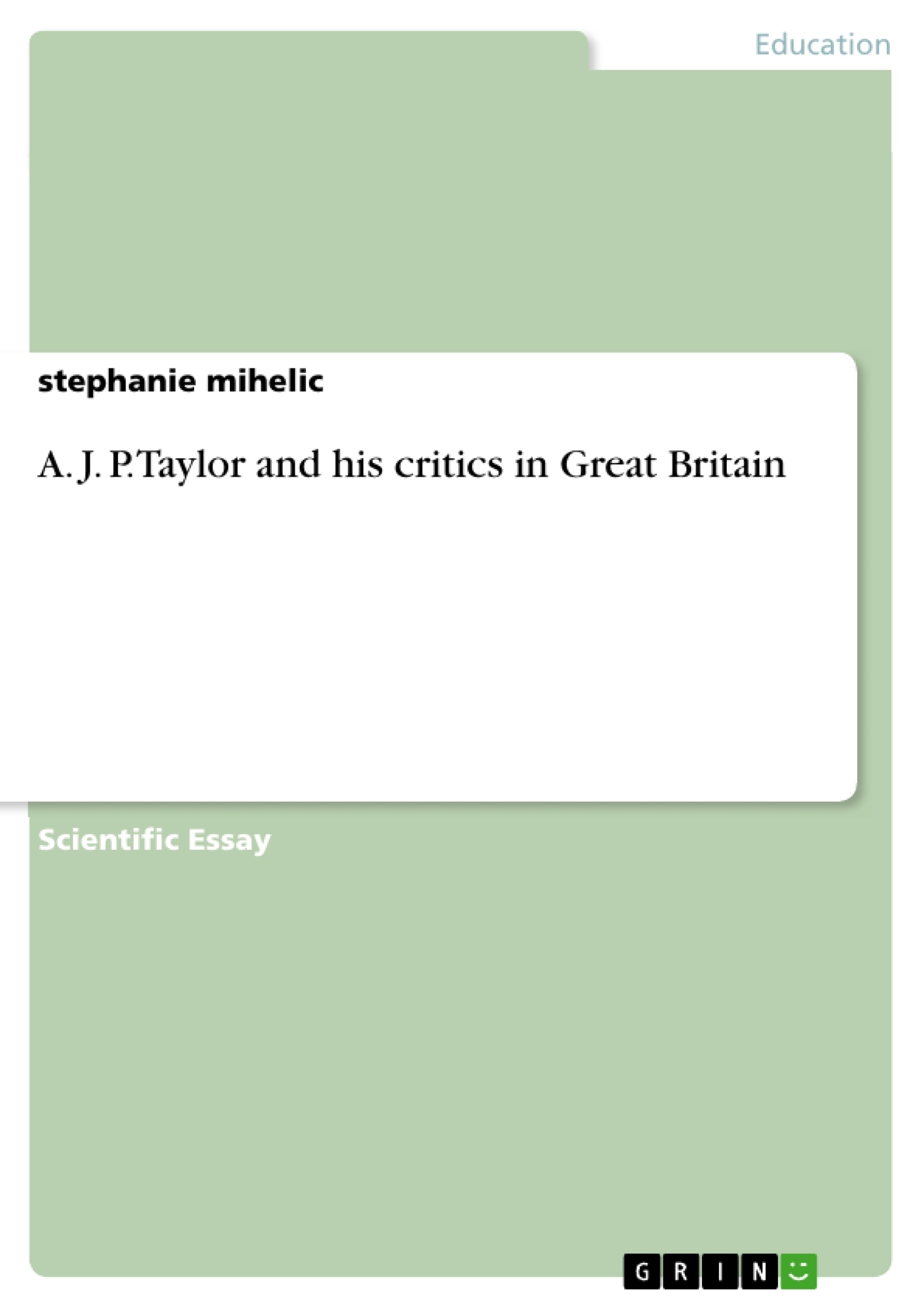A.J.P. Taylor’s The Origins of the Second World War and his
critics in Great Britain
In 1961 A.J.P. Taylor, described as “an enfant terrible among historians” 1 by Ian F. D.
Morrow, discombobulated peer historians with his publication The Origins of the Second
World War. In this book Taylor disputed the orthodox school of war historiography. Taylor's
thesis of the origins of the Second World War has received some support, but primarily
critique. His thesis may be briefly stated. According to Taylor, Hitler was not a demonic
warlord, who had plans of world conquest but was only an ordinary man “who was no more
wicked and unscrupulous than many other contemporary statesman” . Hitler followed a
foreign policy like “that of his predecessors, of the professional diplomats at the foreign
ministry, and indeed of virtually all Germans”. Adolf Hitler was not a “a system-maker,
deliberately preparing from the first a great war which would destroy existing civilisation and make
him master of the world” Hitler's purpose was to liberate Germany from the Treaty of
Versailles that “lacked moral validity from the start” and “to make Germany the leading
Power in Europe from her natural weight.” In fulfilling his goals, Hitler was supported by
appeasers such as Neville and Chamberlain, who believed that Hitler would become pacific if
his demands were met. Hence, all Hitler had to do was waiting for concessions. Taylor
presents Hitler as a passive Fuehrer, without clear intentions. Regarding Danzig and Poland,
Hitler didn't intend its destruction. On the contrary “he had wished to solve the question of
Danzig so that Germany and Poland could remain on good terms.”
[...]
Inhaltsverzeichnis (Table of Contents)
- A.J.P. Taylor's The Origins of the Second World War and his Critics in Great Britain
- The Origins of the Second World War
- The Debate in the Times Literary Supplement
- The Relationship between Taylor and Trevor-Roper
Zielsetzung und Themenschwerpunkte (Objectives and Key Themes)
This paper examines the reception of A.J.P. Taylor's book, The Origins of the Second World War, by historians and scholars in Great Britain. It analyzes the debates sparked by Taylor's unconventional interpretation of the war's origins and the critiques levied by prominent figures like E.H. Carr, David Thomson, and Hugh Trevor-Roper.
- Taylor's revisionist interpretation of the origins of the Second World War
- The role of appeasement in the lead-up to the war
- The character and motivations of Adolf Hitler
- The nature of historical scholarship and the role of evidence
- The personal and professional relationships between historians
Zusammenfassung der Kapitel (Chapter Summaries)
- A.J.P. Taylor's The Origins of the Second World War and his Critics in Great Britain: This chapter introduces A.J.P. Taylor and his controversial book, The Origins of the Second World War, which challenged the prevailing orthodox view of the war's origins. It outlines Taylor's central thesis that Hitler was not a demonic warlord but rather an opportunistic leader who was driven by a desire to revise the Treaty of Versailles and restore Germany's power in Europe.
- The Origins of the Second World War: This chapter delves into Taylor's interpretation of the war's origins, focusing on his views on Hitler's intentions, the role of appeasement, and the actions of key figures like Neville Chamberlain. It explores Taylor's argument that Hitler's actions were driven by a combination of ambition and pragmatism, and that the appeasement policies of Britain and France only served to embolden him.
- The Debate in the Times Literary Supplement: This chapter examines the heated debate that erupted in the Times Literary Supplement in the wake of Taylor's book's publication. It analyzes the critiques offered by various historians and scholars, including E.H. Carr, Isaac Deutscher, David Thomson, and Hugh Trevor-Roper. The chapter highlights the different perspectives on Taylor's thesis and the broader debates surrounding the interpretation of historical events.
- The Relationship between Taylor and Trevor-Roper: This chapter focuses on the complex and often antagonistic relationship between A.J.P. Taylor and Hugh Trevor-Roper, two prominent historians of their time. It explores the reasons behind their rivalry, including their contrasting views on historical methodology and their competition for academic recognition. The chapter also examines how their relationship evolved over time, highlighting instances of both conflict and begrudging respect.
Schlüsselwörter (Keywords)
This work explores the key themes of historical interpretation, revisionist history, the origins of the Second World War, the role of appeasement, the character of Adolf Hitler, and the nature of historical scholarship. It examines the debates surrounding Taylor's controversial thesis and the critiques offered by his contemporaries, highlighting the role of evidence, argumentation, and personal relationships in the development of historical narratives.
Frequently Asked Questions
What was A.J.P. Taylor's controversial thesis?
Taylor argued that Hitler was not a demonic master planner of world conquest but an opportunistic statesman whose goals were similar to previous German leaders.
How did Taylor view the Treaty of Versailles?
He believed the treaty lacked moral validity and that Hitler's primary goal was to liberate Germany from its restrictions and restore Germany as a leading power.
Who were Taylor's main critics in Great Britain?
Prominent critics included Hugh Trevor-Roper, E.H. Carr, David Thomson, and Isaac Deutscher, who challenged his interpretation of Hitler's intentions.
What role did appeasement play in Taylor's analysis?
Taylor suggested that Hitler's success was partly due to the policies of appeasers like Neville Chamberlain, who mistakenly believed Hitler could be pacified with concessions.
What was the relationship between Taylor and Trevor-Roper?
They had a complex and often antagonistic relationship, characterized by public debates in the Times Literary Supplement and differing views on historical methodology.
- Quote paper
- stephanie mihelic (Author), 2011, A. J. P. Taylor and his critics in Great Britain, Munich, GRIN Verlag, https://www.grin.com/document/167726



